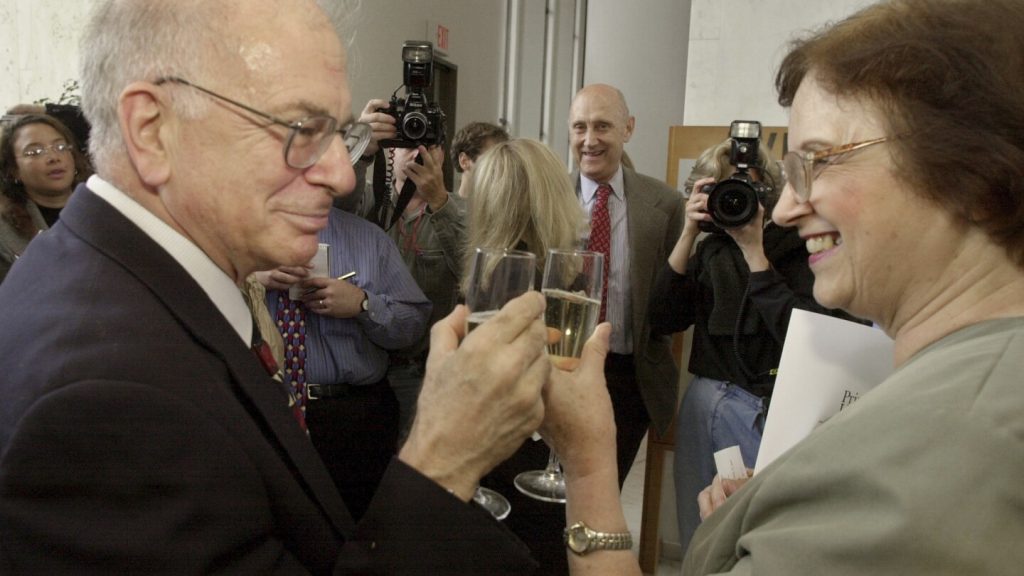Daniel Kahneman, a psychologist who received a Nobel Prize in economics for his research on decision-making biases, passed away at the age of 90. Alongside his collaborator Amos Tversky, Kahneman revolutionized the field of economics by challenging the assumption that individuals are rational actors when making choices. Their work revealed how hidden biases and mental shortcuts can influence decision-making in irrational yet predictable ways, as outlined in Kahneman’s popular book “Thinking, Fast and Slow.” One example Kahneman described was the “leaderless group” challenge used by the Israeli army to assess leadership potential, where observers’ overconfidence in their judgments highlighted the concept of the “illusion of validity.”
Barbara Tversky, the widow of Amos Tversky and a psychology professor at Stanford University, confirmed Kahneman’s passing but did not disclose the cause or location of his death. Kahneman and Tversky’s partnership began in 1969 with a study on researcher intuitions about statistical methods, leading to decades of close collaboration characterized by mutual respect and humor. Their shared work on decision-making revealed key insights, such as the concept of “loss aversion,” which explains why people often prefer to maintain the status quo when faced with choices. This theory, known as prospect theory, has had a significant impact on the field of behavioral economics and earned Kahneman the Nobel Prize in 2002, though Tversky would have likely shared the award if he were alive.
The collaboration between Kahneman and Tversky was marked by a deep intellectual connection and a shared sense of wonder at their combined capabilities. They often alternated as lead authors on their papers, recognizing the synergy of their joint mind that surpassed their individual abilities. Their research on decision-making, including the impact of losses on choices, has had a lasting influence not only in economics but also in psychology and related fields. Their groundbreaking work continues to shape our understanding of how biases and cognitive illusions can affect our everyday decisions, challenging traditional assumptions of rationality.
Kahneman’s contributions to the field of economics, particularly his research on behavioral economics, have had a profound impact on how we understand decision-making processes. By uncovering the prevalence of cognitive biases and irrational tendencies in human behavior, Kahneman and Tversky paved the way for a new approach to studying economic decision-making. Their work has inspired subsequent generations of researchers to explore the complexities of human cognition and decision-making, highlighting the importance of considering psychological factors in economic analyses.
As a pioneer in the field of behavioral economics, Kahneman’s legacy extends beyond his academic contributions to shaping public understanding of how our minds work. Through his bestselling book “Thinking, Fast and Slow,” Kahneman brought complex academic concepts to a broader audience, sparking interest in the psychological foundations of decision-making. His ability to translate research findings into relatable anecdotes and examples has made his work accessible and influential to a wide range of readers, contributing to a broader appreciation of the role of biases in shaping our choices and behaviors. Kahneman’s impact on the fields of economics, psychology, and decision-making will continue to be felt for years to come, as his insights into human cognition and behavior continue to shape our understanding of the world around us.
In his passing, Daniel Kahneman leaves behind a legacy of groundbreaking research that has reshaped our understanding of decision-making processes and cognitive biases. His collaborative work with Amos Tversky has had a lasting impact on the fields of economics, psychology, and behavioral science, influencing generations of researchers and scholars. Kahneman’s ability to challenge traditional assumptions and uncover the hidden influences on our decisions has made him a pioneering figure in the study of human behavior. As we reflect on his contributions, we are reminded of the profound impact that his work continues to have on our understanding of the complexities of the human mind and the importance of recognizing and addressing cognitive biases in our decision-making processes.


